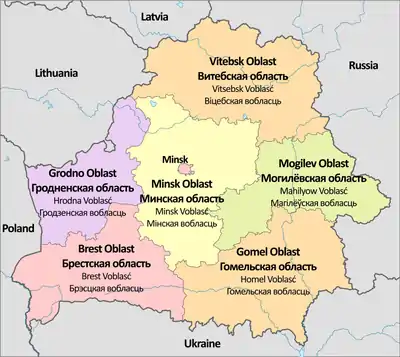Regions of Belarus
At the top level of administration, Belarus is divided into six oblasts (regions) and the city of Minsk,[1] which has a special status being the capital of Belarus. Minsk is also the capital of Minsk Region.[2]
| Regions and the Special administrative district of Belarus Рэгіёны і Спецыяльны адміністратыўны раён Беларусі (in Belarusian) Регионы и Специальный административный район Беларуси (in Russian) | |
|---|---|
 | |
| Category | Unitary State |
| Location | Belarus |
| Created | 1960 |
| Number | 7 Regions |
| Populations | (Regions only): 1,024,751 (Mogilev) – 1,471,240 (Minsk) |
| Areas | (Regions only): 25,118.1 km2 (9,698.14 sq mi) (Grodno) – 40,361.6 km2 (15,583.72 sq mi) (Gomel) |
| Government | Region government |
| Subdivisions | Raion |
.svg.png.webp) |
|---|
| This article is part of a series on the politics and government of Belarus |
|
|
At the second level, the regions are divided into raions (districts).
The layout and extent of the regions were set in 1960 when Belarus (then Byelorussian Soviet Socialist Republic) was a part of the Soviet Union.[3]
History
At the start of the 20th century, the boundaries of the Belarusian lands within the Russian Empire were still being defined. Basically in 1900 it contained the entire Minsk Governorate and Mogilev Governorate, the majority of Grodno Governorate, parts of Vitebsk Governorate and the parts of Vilna Governorate (the latter is now in Lithuania).[3] World War I, the independence of Poland, as well as the 1920-1921 Polish–Soviet War affected the boundaries. In 1921, Belarus had what is now all of Minsk Governorate except for the western fringe, the western part of Gomel Region, a western slice of Mahilyow, and a small part of Vitebsk Region. In 1926 the eastern part of Gomel region was added. [3]
In Soviet Belarus, new administrative units, called oblast or voblast (cognate of Russian word oblast with prothetic v-) were introduced in 1938. And again, during World War II, the boundaries fluctuated. In 1939 they were reset with Belarus gaining territory to the west, Baranavichy, Belastok (Bialystok), Brest, Pinsk, and Vileyka oblasts. In 1944 Belastok was eliminated and the new oblasts of Babruysk, Grodno, and Polotsk were created. At that same time, Vileika oblast was renamed Molodechno oblast.[3]
At different times between 1938 and 1960, the following oblasts existed:
- Babruysk Oblast, created 1944, eliminated 1954
- Baranavichy Oblast, created 1939, eliminated 1954
- Belastok Oblast, created 1939, eliminated 1944 (now Bialystok in Poland)
- Brest Oblast, created 1939
- Gomel Oblast, created 1938
- Grodno Oblast, created 1944
- Maladzyechna Oblast renamed from Vileyka Oblast 1944, eliminated 1960
- Mogilev Oblast, created 1938
- Minsk Oblast, created 1938
- Navahrudak Oblast, created 1939, renamed Baranavichy Oblast December 1939
- Pinsk Oblast, created 1939, eliminated 1954
- Polatsk Oblast, created 1944, eliminated 1954
- Polesia Oblast, created 1938, eliminated 1954
- Vitebsk Oblast, created 1938
- Vileyka Oblast, created 1939, renamed to Maladzyechna Oblast 1944
Regions
| Flag | Subdivision | Capital | Russian | Belarusian | Population (2019 Census)[4] | Area (km²) | Density | Percentage of Belarus | |
|---|---|---|---|---|---|---|---|---|---|
| 1 | Минск | Мінск | 2,018,281 | 305.50 | 6,606.48 | 21.44% | |||
| 2 | Brest Region | Brest | Брестская | Брэсцкая | 1,348,115 | 32,790.68 | 41.11 | 14.32% | |
| 3 | Gomel Region | Gomel | Гомельская | Гомельская | 1,388,512 | 40,361.66 | 34.40 | 14.75% | |
| 4 | Grodno Region | Grodno | Гродненская | Гродзенская | 1,026,816 | 25,118.07 | 40.88 | 10.91% | |
| 5 | Mogilev Region | Mogilev | Могилёвская | Магілёўская | 1,024,751 | 29,079.01 | 35.24 | 10.89% | |
| 6 | Minsk Region | Minsk | Минская | Мінская | 1,471,240 | 39,912.35 | 36.86 | 15.63% | |
| 7 | Vitebsk Region | Vitebsk | Витебская | Вiцебская | 1,135,731 | 40,049.99 | 28.36 | 12.06% | |
| All Belarus | Minsk | 9,413,446 | 207,617.26 | 45.34 | 100.00% | ||||
| Rank | Region | GRP (in BYN)[5] |
GRP (in USD) |
GRP per capita
(in BYN) |
GRP per capita
(in USD)[6] |
|---|---|---|---|---|---|
| 1 | Br 33.0 billion | $16.2 billion | Br 16,300 | $8,000 | |
| 2 | Br 18.1 billion | $8.9 billion | Br 12,800 | $6,300 | |
| 3 | Br 12.3 billion | $6.0 billion | Br 8,600 | $4,200 | |
| 4 | Br 11.5 billion | $5.6 billion | Br 8,300 | $4,100 | |
| 5 | Br 10.0 billion | $4.9 billion | Br 9,600 | $4,700 | |
| 6 | Br 9.1 billion | $4.5 billion | Br 8,000 | $3,900 | |
| 7 | Br 8.5 billion | $4.2 billion | Br 8,100 | $4,000 | |
See also
- ISO 3166-2:BY, the ISO codes of the oblasts of Belarus.
- List of regions of Belarus by Human Development Index
References
- Belarus Regions
- Minsk summary, at the website of the Belarus embassy in Russia.
- "Regions of Belarus". Statoids.
- Official 2019 census results
- https://www.belstat.gov.by/en/ofitsialnaya-statistika/real-sector-of-the-economy/national-accounts/graphical-data-graphs-diagrams/grps-of-regions-and-minsk-city-and-their-percentage-shares-in-gdp-in-2017
- http://www.nbrb.by/engl/statistics/Rates/AvgRate
